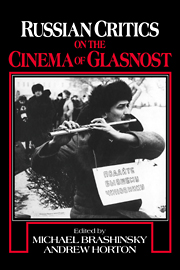Book contents
- Frontmatter
- Contents
- Acknowledgments
- Introduction
- Part One Films in a shifting landscape
- Part Two Glasnost's top ten
- I Repentance
- II Is It Easy To Be Young?
- II A Forgotten Tune for the Flute
- IV The Cold Summer of '53
- V Assa
- VI Commissar
- VII Little Vera
- VIII The Days of Eclipse
- IX The Needle
- X Taxi Blues
- Conclusion
- Directors' biofilmography
- Filmography
- About the contributors
- About the editors
- Index
IX - The Needle
Published online by Cambridge University Press: 04 August 2010
- Frontmatter
- Contents
- Acknowledgments
- Introduction
- Part One Films in a shifting landscape
- Part Two Glasnost's top ten
- I Repentance
- II Is It Easy To Be Young?
- II A Forgotten Tune for the Flute
- IV The Cold Summer of '53
- V Assa
- VI Commissar
- VII Little Vera
- VIII The Days of Eclipse
- IX The Needle
- X Taxi Blues
- Conclusion
- Directors' biofilmography
- Filmography
- About the contributors
- About the editors
- Index
Summary
A young man, Moro, returns to his home town only to find his ex-girlfriend, Dina, becoming a drug addict and himself becoming involved in the bizarre life of the city's underworld. Attempting to save Dina, Moro takes her away to the Aral Sea, turned into a desert by the time they arrive. There Dina seems cured, but back in town everything starts anew. Almost desperate, Moro decides to fight the drug dealers when one of them stabs him in a deserted park.
The Needle [Igla). Directed by Rashid Nugmanov; written by Alexander Baranov and Bakhyt Kilibaev; cinematography by Murat Nugmanov; production design by Murat Mussin; music by Victor Tsoi. Cast: Victor Tsoi, Marina Smirnova, Pyotr Mamonov, and Alexander Bashyrov. Color, 82 min. Kazakhfilm Studios production, 1988.
9. Emptiness is reflected in the shades of Moro (played by the late rock star Victor Tsoi) in The Needle (1988), Rashid Nugmanov's funky meditation on drugs and romance that heralded the Kazakh New Wave. (Photo: Kinocenter and Sovexportfilm.)
Goodbye, America, oh,
The land I've never been to.
Your faded blue jeans are
too tight for me now,
We were taught to love your
forbidden fruits for so long…
The lyrics from a rock ‘n’ roll hit song by Nautilus Pompilius sound almost mystical: Being incidental indeed, as any hit lyrics are, they grasp one generation's complex and intricate sensations. Going through adolescence, which life officially grants us for illusions, this generation wore blue jeans (until they were worn out or altered into shorts), secretly read banned literature, studied the Beatles instead of the Bible, and listened to The Voice of America from Washington, D.C., instead of Good Morning, Moscow.
- Type
- Chapter
- Information
- Russian Critics on the Cinema of Glasnost , pp. 123 - 130Publisher: Cambridge University PressPrint publication year: 1994

